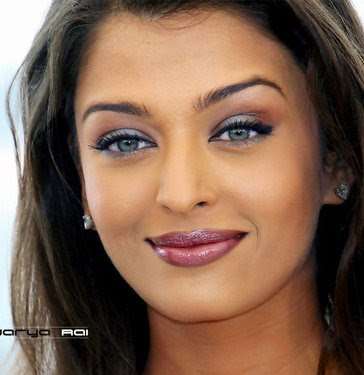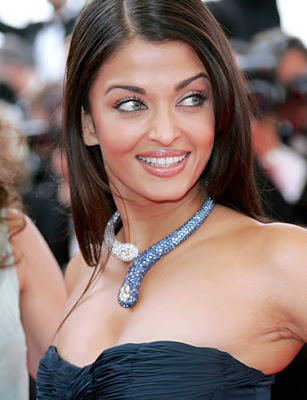Rai made her acting debut in Mani Ratnam's Tamil biopic film, Iruvar (1997) with Mohanlal,The controversial film was a critical success and won many awards including Best Film award at the Belgrade International Film Festival, two National Film Awards, and two Filmfare Awards South. Rai appeared in dual roles, opposite veteran actor Mohanlal, with one of her roles being a cinematic depiction of political leader and ex-actress J. Jayalalithaa. Rai made her Bollywood debut in the film, Aur Pyaar Ho Gaya opposite Bobby Deol, which also released that year; the film did not do well at the box office, was also panned by critics. However, her third project, S. Shankar's Tamil film, Jeans (1998) was a commercial success. The film was also noted for the song "Poovukkul", written by Vairamuthu, in the lyrics of which, she is compared to the seven wonders of the world and described as the eighth.
Success (1999–2002)
In 1999 Rai starred in Sanjay Leela Bhansali's Hum Dil De Chuke Sanam opposite Salman Khan and Ajay Devgan. The film was centered on Rai's character, Nandini, who is forced to marry Devgan's character despite being in love with another man (Khan). As her husband tries to get her to her previous love, she eventually falls for him. Rai's portrayal won her critical acclaim, with a review on Rediff.com writing, "Aishwarya looks beautiful as usual ... This film will most likely draw her accolades from all over, maybe even get her recognised as an actress the way Manisha Koirala did in Khamoshi. In many scenes, there is no trace of makeup and she looks very fresh". The film became her first box office success in Bollywood and earned her first Filmfare Best Actress Award for her.
In the same year she appeared in Subhash Ghai's Taal, in which she played the role of a young village woman, Mansi, who becomes a big pop star after being hurt by her lover played by Akshay Khanna. The film was an average performer in India but was a big success among the international audience, especially in the United States, where it became the first Indian film to reach the top 20 on Variety's box office list. Her performance in the film was praised with Rediff.com writing, "After being praised for her looks and acting talent in Hum Dil De Chuke Sanam, Aishwarya has excelled in Taal. She looks ethereal and unlike the former film, has a very sober and soft role. Though she looks pained and tragic in most of the film, she does a good job of a woman who is very protective of her father and one who doesn't think twice before rejecting a lover who has insulted her father." She received another Best Actress nomination at the Filmfare for her performance in the film.
In 2000, she appeared in Mansoor Khan's Josh alongside Shahrukh Khan and Chandrachur Singh, in which she played a Catholic named Shirley who falls in love with the sibling of her brother's enemy. The film was a commercial success. Later that year she appeared in Satish Kaushik's Hamara Dil Aapke Paas Hai opposite Anil Kapoor. It was a moderate success and her performance earned her a Filmfare Best Actress Award nomination. Later that year she played a supporting role in Aditya Chopra's Mohabbatein alongside Amitabh Bachchan and Shahrukh Khan. The film was a major commercial success and became the second-highest grosser of the year, and it earned her a Filmfare Best Supporting Actress Award nomination. Later that year, she starred in the Tamil film Kandukondain Kandukondain, alongside Mammooty, Ajith Kumar and Tabu.
Rai and Rajinikanth at Machu Picchu, Peru during a song picturization for Enthiran
In 2002, Rai appeared alongside Shahrukh Khan and Madhuri Dixit in Sanjay Leela Bhansali's Devdas, an adaptation of Sharat Chandra Chattopadhyay's famous novel by the same name. She played the role of Paro (Parvati), the love interest of the protagonist, played by Khan. The film received a special screening at the Cannes Film Festival. It became the highest-grossing film of the year in both India and overseas, earning a revenue of Rs 390 million domestically. Devdas won numerous awards, including 10 Filmfare Awards, and Rai received her second Filmfare Best Actress Award for her performance.
Setback (2003–05)
In 2003, she acted in Rituparno Ghosh's Bengali film Chokher Bali, an adaptation of Rabindranath Tagore's novel by the same name. She portrayed the character of a young woman called Binodini, who is left to her own devices when her sickly husband dies soon after they are married. That year she appeared in her home production Dil Ka Rishta with Arjun Rampal and Rohan Sippy's Kuch Na Kaho alongside Abhishek Bachchan, neither of which fared well at the box office.
In 2004 she appeared in Gurinder Chadha's Bollywood-style English adaptation of Pride and Prejudice by Jane Austen, Bride and Prejudice alongside Martin Henderson. She played the role of Lalita Bakshi, the film's counterpart of Elizabeth Bennet in Austen's novel. This was followed by Rajkumar Santoshi's Khakee with Amitabh Bachchan, Akshay Kumar, Ajay Devgan and Jayapradha; in the film she played a negative role for the first time in her career. In the same year she appeared in her second film with Rituparno Ghosh, Raincoat alongside Ajay Devgan. The film was highly acclaimed by the critics, with Rai receiving rave reviews for her performance.
In 2005 she appeared in Shabd, a film based on a love triangle, alongside Sanjay Dutt and Zayed Khan. The film was a box office flop; it received average reviews from the critics. Her next release that year was Paul Mayeda Berges's The Mistress of Spices based on the novel The Mistress of Spices by Chitra Banerjee Divakaruni, in which she starred alongside Dylan McDermott. The film received negative reviews from critics and was also a commercial failure. The same year she made a special appearance in Shaad Ali's Bunty Aur Babli in a hugely popular seven-minute dance sequence for the song "Kajra Re", with Amitabh Bachchan and Abhishek Bachchan.
 aishwarya rai
aishwarya rai aishwarya rai
aishwarya rai aishwarya rai
aishwarya rai aishwarya rai
aishwarya rai aishwarya rai
aishwarya rai aishwarya rai
aishwarya rai aishwarya rai
aishwarya rai aishwarya rai
aishwarya rai aishwarya rai
aishwarya rai aishwarya rai
aishwarya rai aishwarya rai
aishwarya rai aishwarya rai
aishwarya rai aishwarya rai
aishwarya rai
aishwarya rai
No comments:
Post a Comment